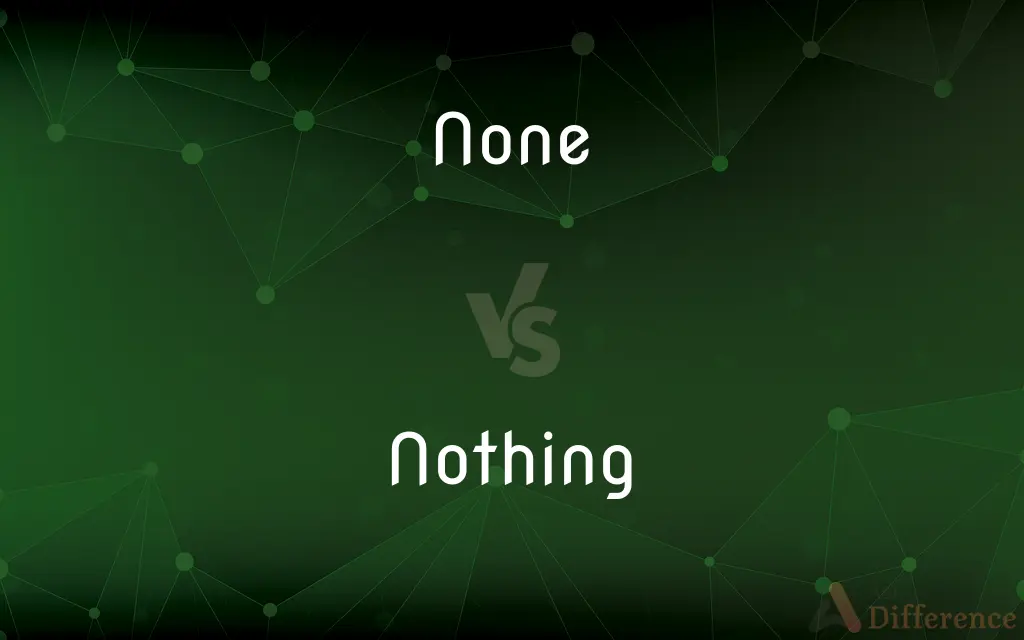None vs. Nothing — What's the Difference?
By Maham Liaqat & Fiza Rafique — Updated on April 16, 2024
"None" emphasizes the absence within a specific group or type, while "nothing" refers to the absolute absence of anything.

Difference Between None and Nothing
Table of Contents
ADVERTISEMENT
Key Differences
"None" is used to denote zero quantity or absence, but within a defined group or category. For instance, if someone says, "None of the apples are red," it specifies there are apples, but none qualify as red. On the other hand, "nothing" is used to express a lack of existence or presence in a more absolute sense, such as when someone says, "There is nothing here," implying the total absence of anything in that location.
While "none" often functions grammatically as a pronoun replacing nouns mentioned earlier in a text or conversation, "nothing" can also serve as a noun or pronoun, but it typically refers to the nonexistence of anything at all. For example, in the sentence, "He offered help, but none was needed," "none" specifically refers to help, which is unneeded.
"None" can sometimes be used in contexts where the set it refers to is implicit, but it still implies some specific, previously understood or mentioned set. Whereas "nothing" is used where the context does not necessarily imply any particular previously mentioned or understood set. For instance, "None succeeded" implies that out of a specific group, no individuals succeeded.
In terms of nuance, "none" carries a slightly formal or literary tone particularly in expressions like "none too pleased," suggesting not very pleased. On the other hand, "nothing" is used in more general and existential expressions, such as "nothing matters," indicating a broader, more philosophical scope of absence.
Comparison Chart
Definition
No part or amount; not any
The absence of anything; no thing
ADVERTISEMENT
Usage as a pronoun
Replaces specific, previously mentioned items
Used to indicate the absence of anything
Contextual Application
Specific to a group or type
General and absolute
Example Sentence
"None of the options were viable."
"There was nothing left after the fire."
Connotation
Often implies a selection or choice among many
Suggests total emptiness or the void
Compare with Definitions
None
Not one (out of a group); not any.
None of the students had completed the assignment.
Nothing
No single thing; not anything.
Nothing was done about the problem.
None
Absolutely no part; no single.
None of the pie was left for latecomers.
Nothing
The state of nonexistence.
Before the universe, there was nothing.
None
No person; nobody.
None were more surprised than I.
Nothing
No part; no portion.
Nothing of the original structure remains.
None
Not at all; in no way.
He is none the wiser about the surprise.
Nothing
No importance or consequence.
It amounts to nothing in the end.
None
Used to indicate that something is negligible or insignificant.
The repair was none too easy.
Nothing
Used to express rejection of something.
Nothing but the best will do.
None
Not at all
He is none too ill.
Nothing
"Nothing", used as a pronoun subject, is the absence of a something or particular thing that one might expect or desire to be present ("We found nothing", "Nothing was there") or the inactivity of a thing or things that are usually or could be active ("Nothing moved", "Nothing happened"). As a predicate or complement "nothing" is the absence of meaning, value, worth, relevance, standing, or significance ("It is a tale/ Told by an idiot, full of sound and fury,/ Signifying nothing"; "The affair meant nothing"; "I'm nothing in their eyes").
None
In no way
The jeans looked none the better for having been washed.
Nothing
Not anything; no single thing
I said nothing
They found nothing wrong
There's nothing you can do
None
Not any of a given number or group.
None of those is a good example. None are even acceptable.
None of this meat tastes right.
Nothing
Having no prospect of progress; of no value
He had a series of nothing jobs
None
No one, nobody.
None of those people is my father.
Nothing
Not at all
He looks nothing like the others
A man who cared nothing for her
None
No person.
None of those people are my parents.
Nothing
Something that has no existence.
None
Not any; no (usually used only before a vowel or h):
Thou shalt have none other gods but me.
Nothing
Something that has no quantitative value; zero
A score of two to nothing.
None
To no extent, in no way.
I felt none the worse for my recent illness.
Nothing
One that has no substance or importance; a nonentity
"A nothing is a dreadful thing to hold onto" (Edna O'Brien).
None
Not at all, not very.
He was none too pleased with the delays in the program that was supposed to be his legacy.
We could hear none too well from the back.
Nothing
Insignificant or worthless
"the utterly nothing role of a wealthy suitor" (Bosley Crowther).
None
(obsolete) No, not.
Nothing
In no way or degree; not at all
She looks nothing like her sister.
None
(chiefly American) A person without religious affiliation.
Nothing
Not any thing; no thing.
None
: the ninth hour after dawn; (Christian) the religious service appointed to this hour.
Nothing
An absence of anything, including empty space, brightness, darkness, matter, or a vacuum.
None
(obsolete) midafternoon: the time around or following noon or nones.
Nothing
Something trifling, or of no consequence or importance.
- What happened to your face?
- It's nothing.
- It's nothing.
None
No one; not one; not anything; - frequently used also partitively, or as a plural, not any.
There is none that doeth good; no, not one.
Six days ye shall gather it, but on the seventh day, which is the Sabbath, in it there shall be none.
Terms of peace yet noneVouchsafed or sought.
None of their productions are extant.
Nothing
A trivial remark especially in the term sweet nothings.
None
No; not any; - used adjectively before a vowel, in old style; as, thou shalt have none assurance of thy life.
Nothing
A nobody insignificant person.
None
Same as Nones, 2.
Nothing
(archaic) Not at all; in no way.
None
A canonical hour that is the ninth hour of the day counting from sunrise
Nothing
Not anything; no thing (in the widest sense of the word thing); - opposed to anything and something.
Yet had his aspect nothing of severe.
None
A service in the Roman Catholic Church formerly read or chanted at 3 PM (the ninth hour counting from sunrise) but now somewhat earlier
Nothing
Nonexistence; nonentity; absence of being; nihility; nothingness.
None
Not any;
Thou shalt have none other gods before me
Nothing
A thing of no account, value, or note; something irrelevant and impertinent; something of comparative unimportance; utter insignificance; a trifle.
Behold, ye are of nothing, and your work of nought.
'T is nothing, says the fool; but, says the friend,This nothing, sir, will bring you to your end.
None
Not at all or in no way;
Seemed none too pleased with his dinner
Shirt looked none the worse for having been slept in
None too prosperous
The passage is none too clear
Nothing
A cipher; naught.
Nothing
In no degree; not at all; in no wise.
Adam, with such counsel nothing swayed.
The influence of reason in producing our passions is nothing near so extensive as is commonly believed.
Nothing
A quantity of no importance;
It looked like nothing I had ever seen before
Reduced to nil all the work we had done
We racked up a pathetic goose egg
It was all for naught
I didn't hear zilch about it
Nothing
A nonexistent thing
Nothing
In no way; to no degree;
He looks nothing like his father
Common Curiosities
Which is more formal, "none" or "nothing"?
"None" is considered slightly more formal than "nothing," especially in specific phrases or literary uses.
How does "nothing" enhance a sentence differently than "none"?
"Nothing" emphasizes a total lack of existence or presence, adding a more absolute or existential dimension to a sentence, while "none" focuses on the absence from a specific, identified set.
What grammatical role does "none" usually play in sentences?
"None" typically functions as a pronoun, replacing nouns or noun phrases previously mentioned or understood in the discourse.
hat is the primary difference in usage between "none" and "nothing"?
"None" is used with reference to a specific set or group, implying that not one or not any of the set is included or applies. "Nothing" refers to the absence of anything at all, with no reference to any particular group.
What implications does "nothing" carry in philosophical or existential discussions?
In philosophical or existential contexts, "nothing" often relates to concepts of emptiness, the void, or the nature of non-existence, frequently sparking deeper reflections on being and nothingness.
Is "none" singular or plural?
"None" can be both singular or plural depending on the context and the noun it refers to.
In what contexts might "none" be preferred over "nothing"?
"None" is preferred when discussing the absence of any members or elements from a specific, predefined group, such as in responses to questions about quantity or presence within a known set.
When should "nothing" be used instead of "none"?
"Nothing" should be used when referring to the absence of anything in a more universal or existential context, or when no prior reference group has been mentioned.
Is there a scenario where "none" and "nothing" might mean the same?
In casual usage, they might sometimes seem interchangeable in negative constructions, but technically, "none" refers to not any of a particular thing, and "nothing" refers to the absence of existence.
Can "none" and "nothing" be used interchangeably?
They are not generally interchangeable as "none" is used in relation to a specified set, whereas "nothing" is used to denote a complete absence, regardless of any set.
How can the use of "nothing" affect the tone of a statement?
The use of "nothing" can convey a stronger, often more definitive or final tone to a statement, emphasizing a complete lack of existence, activity, or substance.
Can "none" be used in mathematical contexts?
Yes, "none" can be used to indicate zero quantity in mathematical or statistical contexts, particularly in responses to how many items in a set meet a certain condition.
What is a simple mnemonic to remember the difference between "none" and "nothing"?
Think of "none" as "not one" from a group, and "nothing" as "not anything" at all, highlighting the context-specific versus absolute nature of their usage.
Can "nothing" imply a sense of possibility or potential?
Yes, "nothing" can sometimes imply a sense of unlimited possibilities when used in contexts suggesting a clean slate or absence of restrictions, as in "nothing is impossible."
How do "none" and "nothing" interact with other words to form common phrases?
"None" is often used in phrases like "none too pleased" to mean hardly or not very, whereas "nothing" forms phrases like "nothing but" to emphasize exclusivity.
Share Your Discovery

Previous Comparison
Hedge vs. Edge
Next Comparison
Thinking vs. ThoughtAuthor Spotlight
Written by
Maham LiaqatCo-written by
Fiza RafiqueFiza Rafique is a skilled content writer at AskDifference.com, where she meticulously refines and enhances written pieces. Drawing from her vast editorial expertise, Fiza ensures clarity, accuracy, and precision in every article. Passionate about language, she continually seeks to elevate the quality of content for readers worldwide.














































